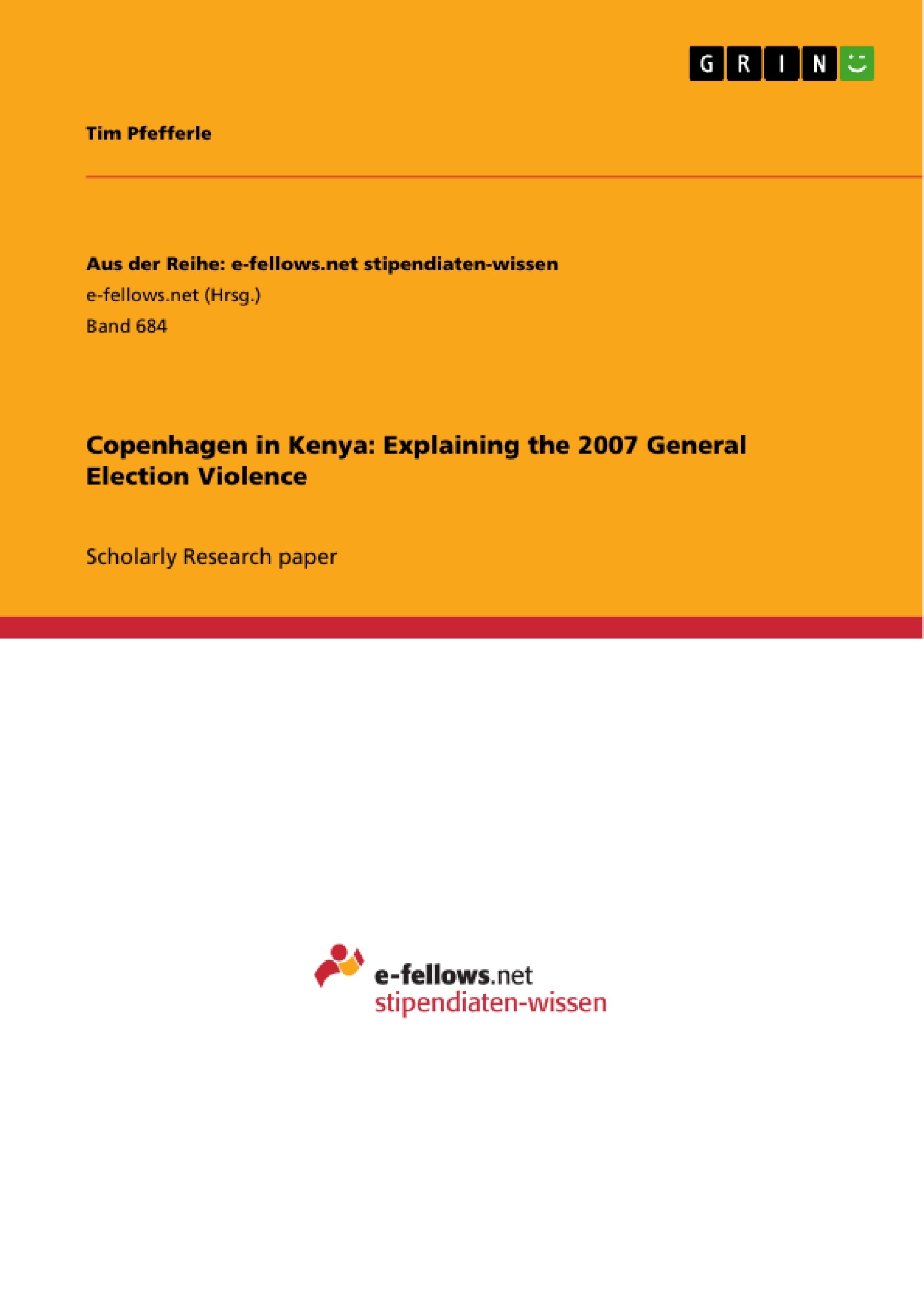An analysis of the 2007 post-election violence in Kenya, employing the framework of the Copenhagen theory of Securitization to explain the causes of conflict. There is a focus on the three issues of youth, land and unemployment, as well as ethnicity and "otherness".
Inhaltsverzeichnis (Table of Contents)
- Introduction
- Background
- The Copenhagen School of Securitization
- The Neoliberal Interpretation
- The Generational Conflict
- Economic Factors: Land and Unemployment
Zielsetzung und Themenschwerpunkte (Objectives and Key Themes)
This paper aims to explain the violence that erupted in Kenya following the 2007 general elections using the securitization framework of the Copenhagen School. It investigates the root causes of the conflict, focusing on three key issues: the generational struggle, the economic dimension of land and unemployment, and the construction of ethnic identities.
- Securitization and the construction of security threats
- The role of discourse in shaping perceptions of security
- The impact of generational tensions and economic disparities
- The influence of ethnic identities in shaping the conflict
- The interplay of land ownership, unemployment, and political power
Zusammenfassung der Kapitel (Chapter Summaries)
- Introduction: This chapter introduces the context of the 2007 Kenyan general elections, highlighting the violence that followed the results. It outlines the paper's objective to employ the Copenhagen School's securitization framework to explain the conflict and presents the three key issues that will be explored.
- Background: This chapter provides a brief overview of the events that led to the violence, including the disputed election results, the protests, and the subsequent violence. It also highlights the impact of the conflict on Kenya, both politically and economically.
- The Copenhagen School of Securitization: This chapter introduces the theoretical framework used in the paper, focusing on the Copenhagen School's concept of securitization. It explains how securitization theory analyzes the construction of security threats through discourse, emphasizing the role of language in shaping perceptions and responses to security issues.
- The Neoliberal Interpretation: This chapter offers a perspective on the Kenyan post-election conflict from a Neoliberal viewpoint. It argues that the conflict was fueled by weaknesses within Kenyan institutions, particularly the lack of independence of the Electoral Commission of Kenya (ECK) and the ineffective nature of the party system.
- The Generational Conflict: This chapter explores the generational divide as a potential catalyst for the violence. It examines how the conflict may have been fueled by the aspirations of Kenya's younger generation, who felt marginalized and disillusioned by the political system. It analyzes the construction of identities and the role of discourse in shaping perceptions of this generational struggle.
- Economic Factors: Land and Unemployment: This chapter investigates the economic factors that contributed to the conflict, focusing on the issues of land ownership and unemployment. It analyzes how land disputes, particularly in the Rift Valley, fueled ethnic tensions and how unemployment, particularly in areas like Kibera and Kisumu, exacerbated social and economic grievances.
Schlüsselwörter (Keywords)
This paper focuses on the 2007 Kenyan general elections, the subsequent violence, and the underlying factors that contributed to the conflict. Key themes include: securitization, discourse, identity construction, generational struggle, economic disparity, land ownership, unemployment, ethnicity, and the Copenhagen School.
Frequently Asked Questions
What caused the 2007 post-election violence in Kenya?
The violence was triggered by disputed election results, but rooted in deeper issues like generational conflict, land disputes, and ethnic tensions.
What is the Copenhagen School of Securitization?
It is a theoretical framework that analyzes how specific issues (like land or ethnicity) are constructed as security threats through political discourse.
How did generational conflict contribute to the violence?
Kenya's younger generation felt marginalized and disillusioned by the political system, leading to social grievances that erupted during the election crisis.
Why was land a key factor in the Kenyan conflict?
Land ownership disputes, particularly in the Rift Valley, fueled ethnic "otherness" and were used by political actors to mobilize supporters against perceived threats.
What is the Neoliberal interpretation of the crisis?
This view argues that the conflict resulted from weak institutions, such as the lack of independence of the Electoral Commission of Kenya (ECK).
How does discourse shape perceptions of security?
Securitization theory emphasizes that language and political rhetoric can transform social issues into existential threats, justifying extraordinary measures or violence.
- Quote paper
- Tim Pfefferle (Author), 2013, Copenhagen in Kenya: Explaining the 2007 General Election Violence, Munich, GRIN Verlag, https://www.grin.com/document/210278



